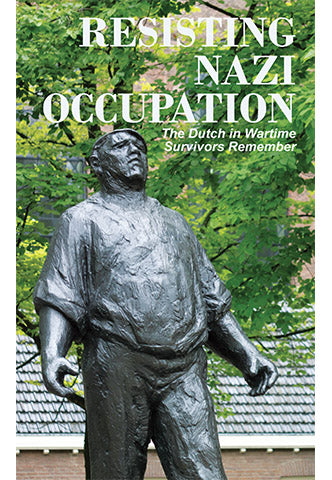Dutch the store
Resisting Nazi Occupation
Couldn't load pickup availability
The Dutch in Wartime: Survivors Remember is a series of books with wartime memories of Dutch immigrants to North America, who survived the Nazi occupation of The Netherlands.
In Book 4: Resisting Nazi Occupation, we read how ordinary citizens risk their freedom and ultimately their lives opposing the brutal regime of the occupying forces. Even in the most mundane activities, like heating the house, or listening to the radio, the choice Dutch citizens faced was stark: collaborate or resist!
Designed and written to be easily accessible to readers of all ages and backgrounds, these books contain important stories about the devastating effects of war and occupation on a civilian population.
Edited by Anne van Arragon Hutten.
108 pages
Historical background, map and 35 wartime memories.
ISBN: 978-0-3968308-5-3
On the cover: ‘The Dockworker’, sculpture by Mari Andriessen commemorating the February Strike of 1941. (Photo: Hein Bijvoet)
READ AN EXCERPT
… When the Resistance people told us that Dad would be picked up for interrogation that night, the doctor suggested that we should move him. Which is what we did. My mother, sister and I burned as much incriminating material as we could find. I still delivered some papers before curfew at 8 p.m. and then we went to bed.
That night they came, searched the house, and took my mother to the local jail. My sister and I could not sleep anymore and we discussed what we should do. One thing was to clear the house of all food items, precious belongings and clothes because we could not stay there.
The local jail was an impressive three-storey building built like a fort, with a moat around it. My mother was in a cell with other women, two of them couriers. In another part of this jail were two of the Resistance leaders who had been ‘interrogated’ several times and could break down at any time. That would cause hundreds of people to be picked up for illegal activities. It was imperative that they be freed from jail.
On December 8, the Resistance was able to get fifty political prisoners out. Thanks to careful planning it took only one hour to get everybody out and into a hiding place before 8 p.m. when no one was allowed to be out in the street.
The next morning the city buzzed with all kinds of stories: that the prisoners had been moved by ambulances to the outside of the city, and other tales. In fact all of them had been housed in hiding places within the city, and none of them, nor any of the liberators, was caught. They were all provided with a new name, picture identification, and other necessities.
My sister and I were told by the Resistance to leave the city immediately. We were provided with a bike and were on our way within an hour to join our brother who was hiding on a farm thirty miles away. He was shocked to see us, since he had not known that Mom had been jailed.
On Saturday, December 23, a stranger on a bike rode up the farm’s almost mile-long driveway. He looked somewhat familiar. He had a mustache, wore wooden shoes, and had on a funny sailor’s cap. Since one never knew who might come up the driveway, my brother and two others were already in their hiding places when we recognized Dad. He had hoped that we would be on that farm. That night the farmer found a bed for him too.
On Christmas Eve a lady rode up the driveway and sure enough, she was our mother. She had biked about forty miles that frosty day. It was a long evening before we all went to bed.
A few days later another visitor came to tell us that having five members of one family in one hiding place was too many. As a result, my sister Truus and I were sent to a widow with three unmarried daughters, and my parents were moved to a young couple not too far away from us. We stayed there until early May when the Canadian army liberated our hometown.
Hans Hofenk
Abbotsford, British Columbia

